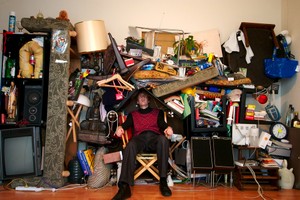Answer yes or no to the following questions. The more statements you strongly agree with; the greater the probability of a diagnosis of compulsive hoarding.
1. I will keep multiple copies of identical items. Just in case.
2. I feel ashamed by the state of my house
3. My quantity of personal possessions causes family discord
4. It is difficult to walk through certain areas of my house, due to the quantity of possessions
5. There are certain rooms in my house that cannot be used as they were intended for, due to the amount of personal belongings stored within
6. Sometimes when I throw something out, I later change my mind and retrieve it out of the garbage
7. I often misplace items amongst the clutter
8. I do not like to have visitors over to see the way I live
9. I sometimes buy many copies of similar items, more than I need
10. When I try to throw things out, I feel anxiety
11. I keep old newspapers or magazines, so that I have access to that information if needed
12. Some of the chairs or tables in my house are unusable, as they have been covered with possessions
13. I do not like it when friends of family members handle my belongings
14. I like to keep any belonging with sentimental value
15. I love bargains and will buy things that are great deals, even if I do not need them
16. Some people consider the possessions that I keep and love to be “junk”
17. I spend a lot of time thinking about my belongings
18. There are things in my house that need repairing, that are not getting fixed due to the clutter
19. I buy things that I do not need, especially when they are “good deals”
20. I cannot control my urges to buy new possessions
21. The clutter in my house keeps me from doing things that I want to do
22. The clutter in my house feels “overwhelming”
Although not a clinical evaluation of compulsive hoarding, the more statements that you strongly identify with, the greater the likelihood that you have a problem with compulsive hoarding.
If you have a problem with hoarding and decide you want treatment, then cognitive behavioral therapy, and sometimes medication, can help you to overcome your disorder and take back control of the way you live.
Page last updated Dec 08, 2015


